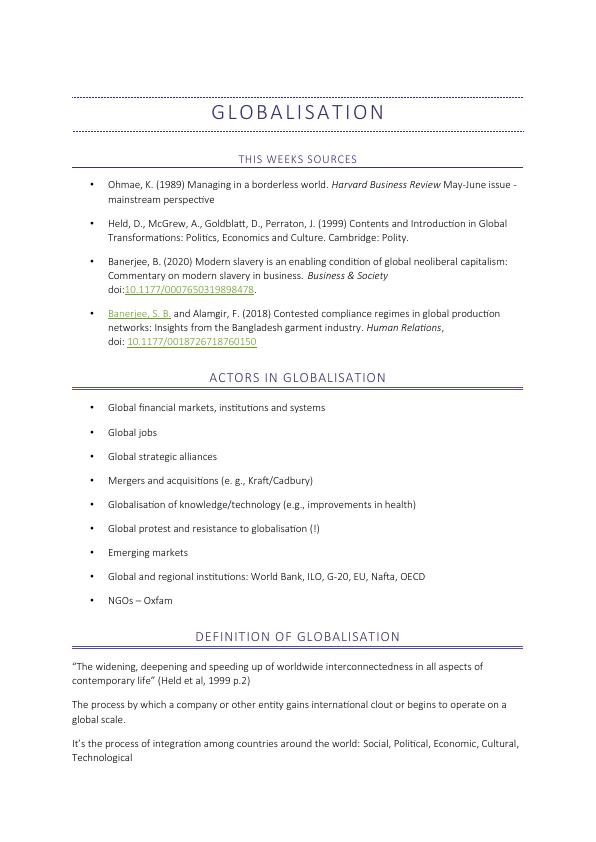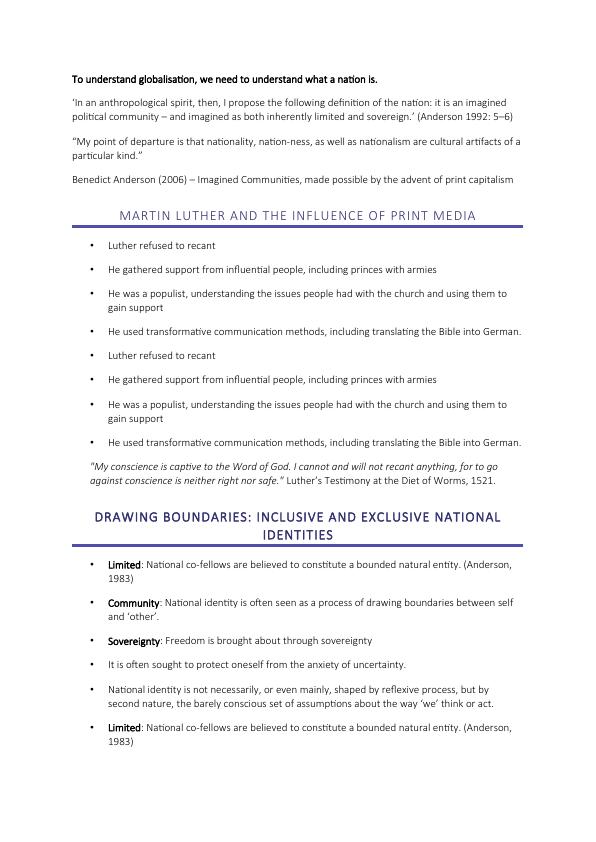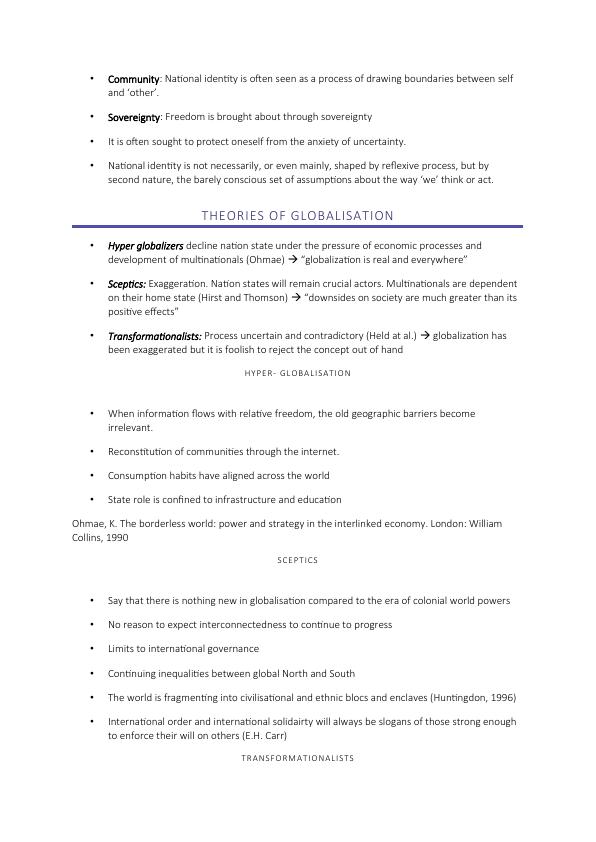Ask a question from expert
Managing in a borderless world : Oxfam definition of globalisation
7 Pages1923 Words264 Views
Added on 2022-01-20
Managing in a borderless world : Oxfam definition of globalisation
Added on 2022-01-20
BookmarkShareRelated Documents
G L O B A L I S A T I O N
THIS WEEKS SOURCES
• Ohmae, K. (1989) Managing in a borderless world. Harvard Business Review May-June issue -
mainstream perspective
• Held, D., McGrew, A., Goldblatt, D., Perraton, J. (1999) Contents and Introduction in Global
Transformations: Politics, Economics and Culture. Cambridge: Polity.
• Banerjee, B. (2020) Modern slavery is an enabling condition of global neoliberal capitalism:
Commentary on modern slavery in business. Business & Society
doi:10.1177/0007650319898478.
• Banerjee, S. B. and Alamgir, F. (2018) Contested compliance regimes in global production
networks: Insights from the Bangladesh garment industry. Human Relations,
doi: 10.1177/0018726718760150
ACTORS IN GLOBALISATION
• Global financial markets, institutions and systems
• Global jobs
• Global strategic alliances
• Mergers and acquisitions (e. g., Kraft/Cadbury)
• Globalisation of knowledge/technology (e.g., improvements in health)
• Global protest and resistance to globalisation (!)
• Emerging markets
• Global and regional institutions: World Bank, ILO, G-20, EU, Nafta, OECD
• NGOs – Oxfam
DEFINITION OF GLOBALISATION
“The widening, deepening and speeding up of worldwide interconnectedness in all aspects of
contemporary life” (Held et al, 1999 p.2)
The process by which a company or other entity gains international clout or begins to operate on a
global scale.
It’s the process of integration among countries around the world: Social, Political, Economic, Cultural,
Technological
THIS WEEKS SOURCES
• Ohmae, K. (1989) Managing in a borderless world. Harvard Business Review May-June issue -
mainstream perspective
• Held, D., McGrew, A., Goldblatt, D., Perraton, J. (1999) Contents and Introduction in Global
Transformations: Politics, Economics and Culture. Cambridge: Polity.
• Banerjee, B. (2020) Modern slavery is an enabling condition of global neoliberal capitalism:
Commentary on modern slavery in business. Business & Society
doi:10.1177/0007650319898478.
• Banerjee, S. B. and Alamgir, F. (2018) Contested compliance regimes in global production
networks: Insights from the Bangladesh garment industry. Human Relations,
doi: 10.1177/0018726718760150
ACTORS IN GLOBALISATION
• Global financial markets, institutions and systems
• Global jobs
• Global strategic alliances
• Mergers and acquisitions (e. g., Kraft/Cadbury)
• Globalisation of knowledge/technology (e.g., improvements in health)
• Global protest and resistance to globalisation (!)
• Emerging markets
• Global and regional institutions: World Bank, ILO, G-20, EU, Nafta, OECD
• NGOs – Oxfam
DEFINITION OF GLOBALISATION
“The widening, deepening and speeding up of worldwide interconnectedness in all aspects of
contemporary life” (Held et al, 1999 p.2)
The process by which a company or other entity gains international clout or begins to operate on a
global scale.
It’s the process of integration among countries around the world: Social, Political, Economic, Cultural,
Technological

To understand globalisation, we need to understand what a nation is.
‘In an anthropological spirit, then, I propose the following definition of the nation: it is an imagined
political community – and imagined as both inherently limited and sovereign.’ (Anderson 1992: 5–6)
“My point of departure is that nationality, nation-ness, as well as nationalism are cultural artifacts of a
particular kind.”
Benedict Anderson (2006) – Imagined Communities, made possible by the advent of print capitalism
MARTIN LUTHER AND THE INFLUENCE OF PRINT MEDIA
• Luther refused to recant
• He gathered support from influential people, including princes with armies
• He was a populist, understanding the issues people had with the church and using them to
gain support
• He used transformative communication methods, including translating the Bible into German.
• Luther refused to recant
• He gathered support from influential people, including princes with armies
• He was a populist, understanding the issues people had with the church and using them to
gain support
• He used transformative communication methods, including translating the Bible into German.
"My conscience is captive to the Word of God. I cannot and will not recant anything, for to go
against conscience is neither right nor safe." Luther’s Testimony at the Diet of Worms, 1521.
DRAWING BOUNDARIES: INCLUSIVE AND EXCLUSIVE NATIONAL
IDENTITIES
• Limited: National co-fellows are believed to constitute a bounded natural entity. (Anderson,
1983)
• Community: National identity is often seen as a process of drawing boundaries between self
and ‘other’.
• Sovereignty: Freedom is brought about through sovereignty
• It is often sought to protect oneself from the anxiety of uncertainty.
• National identity is not necessarily, or even mainly, shaped by reflexive process, but by
second nature, the barely conscious set of assumptions about the way ‘we’ think or act.
• Limited: National co-fellows are believed to constitute a bounded natural entity. (Anderson,
1983)
‘In an anthropological spirit, then, I propose the following definition of the nation: it is an imagined
political community – and imagined as both inherently limited and sovereign.’ (Anderson 1992: 5–6)
“My point of departure is that nationality, nation-ness, as well as nationalism are cultural artifacts of a
particular kind.”
Benedict Anderson (2006) – Imagined Communities, made possible by the advent of print capitalism
MARTIN LUTHER AND THE INFLUENCE OF PRINT MEDIA
• Luther refused to recant
• He gathered support from influential people, including princes with armies
• He was a populist, understanding the issues people had with the church and using them to
gain support
• He used transformative communication methods, including translating the Bible into German.
• Luther refused to recant
• He gathered support from influential people, including princes with armies
• He was a populist, understanding the issues people had with the church and using them to
gain support
• He used transformative communication methods, including translating the Bible into German.
"My conscience is captive to the Word of God. I cannot and will not recant anything, for to go
against conscience is neither right nor safe." Luther’s Testimony at the Diet of Worms, 1521.
DRAWING BOUNDARIES: INCLUSIVE AND EXCLUSIVE NATIONAL
IDENTITIES
• Limited: National co-fellows are believed to constitute a bounded natural entity. (Anderson,
1983)
• Community: National identity is often seen as a process of drawing boundaries between self
and ‘other’.
• Sovereignty: Freedom is brought about through sovereignty
• It is often sought to protect oneself from the anxiety of uncertainty.
• National identity is not necessarily, or even mainly, shaped by reflexive process, but by
second nature, the barely conscious set of assumptions about the way ‘we’ think or act.
• Limited: National co-fellows are believed to constitute a bounded natural entity. (Anderson,
1983)

• Community: National identity is often seen as a process of drawing boundaries between self
and ‘other’.
• Sovereignty: Freedom is brought about through sovereignty
• It is often sought to protect oneself from the anxiety of uncertainty.
• National identity is not necessarily, or even mainly, shaped by reflexive process, but by
second nature, the barely conscious set of assumptions about the way ‘we’ think or act.
THEORIES OF GLOBALISATION
• Hyper globalizers decline nation state under the pressure of economic processes and
development of multinationals (Ohmae) “globalization is real and everywhere”
• Sceptics: Exaggeration. Nation states will remain crucial actors. Multinationals are dependent
on their home state (Hirst and Thomson) “downsides on society are much greater than its
positive effects”
• Transformationalists: Process uncertain and contradictory (Held at al.) globalization has
been exaggerated but it is foolish to reject the concept out of hand
H YP E R - G L O B A L I S A T I O N
• When information flows with relative freedom, the old geographic barriers become
irrelevant.
• Reconstitution of communities through the internet.
• Consumption habits have aligned across the world
• State role is confined to infrastructure and education
Ohmae, K. The borderless world: power and strategy in the interlinked economy. London: William
Collins, 1990
S C E P T I C S
• Say that there is nothing new in globalisation compared to the era of colonial world powers
• No reason to expect interconnectedness to continue to progress
• Limits to international governance
• Continuing inequalities between global North and South
• The world is fragmenting into civilisational and ethnic blocs and enclaves (Huntingdon, 1996)
• International order and international solidairty will always be slogans of those strong enough
to enforce their will on others (E.H. Carr)
T R A N S F O R M A T I O N A L I S T S
and ‘other’.
• Sovereignty: Freedom is brought about through sovereignty
• It is often sought to protect oneself from the anxiety of uncertainty.
• National identity is not necessarily, or even mainly, shaped by reflexive process, but by
second nature, the barely conscious set of assumptions about the way ‘we’ think or act.
THEORIES OF GLOBALISATION
• Hyper globalizers decline nation state under the pressure of economic processes and
development of multinationals (Ohmae) “globalization is real and everywhere”
• Sceptics: Exaggeration. Nation states will remain crucial actors. Multinationals are dependent
on their home state (Hirst and Thomson) “downsides on society are much greater than its
positive effects”
• Transformationalists: Process uncertain and contradictory (Held at al.) globalization has
been exaggerated but it is foolish to reject the concept out of hand
H YP E R - G L O B A L I S A T I O N
• When information flows with relative freedom, the old geographic barriers become
irrelevant.
• Reconstitution of communities through the internet.
• Consumption habits have aligned across the world
• State role is confined to infrastructure and education
Ohmae, K. The borderless world: power and strategy in the interlinked economy. London: William
Collins, 1990
S C E P T I C S
• Say that there is nothing new in globalisation compared to the era of colonial world powers
• No reason to expect interconnectedness to continue to progress
• Limits to international governance
• Continuing inequalities between global North and South
• The world is fragmenting into civilisational and ethnic blocs and enclaves (Huntingdon, 1996)
• International order and international solidairty will always be slogans of those strong enough
to enforce their will on others (E.H. Carr)
T R A N S F O R M A T I O N A L I S T S

End of preview
Want to access all the pages? Upload your documents or become a member.